October 2023
Will Orthotics Help With Flat Feet?
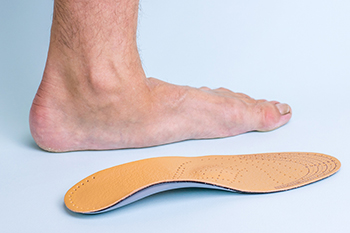
Flat feet, or fallen arches, are a common condition that can lead to discomfort and pain in the feet, knees, and even the lower back. Walking and standing for long periods can be uncomfortable in people with collapsed arches. Also, due to lack of a supportive arch, there can be substantial pressure on other parts of the foot, causing problems with posture and foot movement. A fallen arch can also strain the ligaments and tendons of the foot and leg. One solution to overcoming the discomfort of having flat feet is wearing orthotic inserts in your shoes. It's important to have an insole that strikes the right balance between rigidity and flexibility. Insoles that are too firm may lack the proper amount of shock absorption, while overly cushioned insoles may not provide the support necessary to counteract flat feet. People with problematic flat feet may wish to consider investing in orthotics that are made especially for their feet. A podiatrist can examine your feet and make molds for orthotics that are individualized for you. Because the feet may need some time to adapt to the changes provided by insoles, it is a good idea to gradually increase the time you wear them in the beginning. For help with flat feet and custom orthotics, it is suggested that you make an appointment with a podiatrist.
If you are having discomfort in your feet and would like to try orthotics, contact one of our podiatrists from Central Ohio Comprehensive Foot Care. Our doctors can provide the care you need to keep you pain-free and on your feet.
What Are Orthotics?
Orthotics are inserts you can place into your shoes to help with a variety of foot problems such as flat feet or foot pain. Orthotics provide relief and comfort for minor foot and heel pain but can’t correct serious biomechanical problems in your feet.
Over-the-Counter Inserts
Orthotics come in a wide variety of over-the-counter inserts that are used to treat foot pain, heel pain, and minor problems. For example, arch supports can be inserted into your shoes to help correct overarched or flat feet, while gel insoles are often used because they provide comfort and relief from foot and heel pain by alleviating pressure.
Prescription Orthotics
If over-the-counter inserts don’t work for you or if you have a more severe foot concern, it is possible to have your podiatrist prescribe custom orthotics. These high-quality inserts are designed to treat problems such as abnormal motion, plantar fasciitis, and severe forms of heel pain. They can even be used to help patients suffering from diabetes by treating foot ulcers and painful calluses and are usually molded to your feet individually, which allows them to provide full support and comfort.
If you are experiencing minor to severe foot or heel pain, it’s recommended to speak with your podiatrist about the possibilities of using orthotics. A podiatrist can determine which type of orthotic is right for you and allow you to take the first steps towards being pain-free.
If you have any questions please contact one of our offices located in Delaware and Westerville, OH . We offer the newest diagnostic and treatment technologies for all your foot and ankle needs.
Everyday Foot Care Tips for Healthy Feet
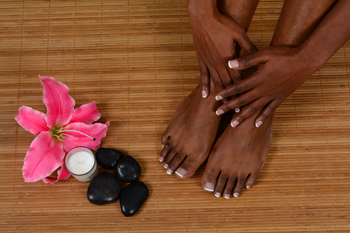
Our feet bear the brunt of our daily activities, making everyday foot care an essential part of maintaining overall well-being. There are several practical tips to ensure your feet stay healthy and pain-free. These can begin with washing your feet daily, ensuring to dry thoroughly, especially between the toes. Keeping your toenails trimmed straight across and not too short may help to prevent ingrown toenails. Choose comfortable, well-fitting shoes that provide proper arch support and cushioning. Additionally, it is beneficial to alternate your shoes to give them time to air out, reducing the risk of foot odor and fungal infections. Regularly moisturize your feet to prevent dry, cracked skin. Performing regular foot stretches and massages can help improve circulation and relieve tension. Be mindful of foot pain or discomfort, as early intervention can prevent more significant issues. Lastly, maintaining a healthy weight and staying active can reduce the strain on your feet. If you would like to have more information about everyday foot care tips, it is suggested that you confer with a podiatrist.
Everyday foot care is very important to prevent infection and other foot ailments. If you need your feet checked, contact one of our podiatrists from Central Ohio Comprehensive Foot Care. Our doctors can provide the care you need to keep you pain-free and on your feet.
Everyday Foot Care
Often, people take care of their bodies, face and hair more so than they do for their feet. But the feet are a very important aspect of our bodies, and one that we should pay more attention to. Without our feet, we would not be able to perform most daily tasks.
It is best to check your feet regularly to make sure there are no new bruises or cuts that you may not have noticed before. For dry feet, moisturizer can easily be a remedy and can be applied as often as necessary to the affected areas. Wearing shoes that fit well can also help you maintain good foot health, as well as making it easier to walk and do daily activities without the stress or pain of ill-fitting shoes, high heels, or even flip flops. Wearing clean socks with closed shoes is important to ensure that sweat and bacteria do not accumulate within the shoe. Clean socks help to prevent Athlete’s foot, fungi problems, bad odors, and can absorb sweat.
If you have any questions please feel free to contact one of our offices located in Delaware and Westerville, OH . We offer the newest diagnostic and treatment technologies for all your foot and ankle needs.
Caring for Diabetic Foot Wounds
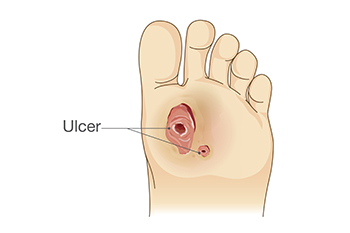
Managing diabetic foot wounds is important for individuals with diabetes, as they are susceptible to slow healing wounds that can escalate into severe complications. First, meticulous wound care is essential. This can begin with cleaning the wound daily with mild soap and warm water, followed by applying an antibiotic ointment and covering with a sterile dressing. Offloading pressure from the affected foot is suggested, as this can be achieved with special footwear, custom orthotics, or using assistive devices, such as crutches. Regular monitoring for signs of infection, such as increased redness, swelling, or discharge, is vital. Keeping blood sugar levels under control is fundamental, as high blood sugar can impede the healing process. If you have diabetes, it is strongly suggested that you are under the care of a podiatrist who can help you to manage any foot wounds that may develop.
Diabetic foot care is important in preventing foot ailments such as ulcers. If you are suffering from diabetes or have any other concerns about your feet, contact one of our podiatrists from Central Ohio Comprehensive Foot Care. Our doctors can provide the care you need to keep you pain-free and on your feet.
Diabetic Foot Care
Diabetes affects millions of people every year. The condition can damage blood vessels in many parts of the body, especially the feet. Because of this, taking care of your feet is essential if you have diabetes, and having a podiatrist help monitor your foot health is highly recommended.
The Importance of Caring for Your Feet
- Routinely inspect your feet for bruises or sores.
- Wear socks that fit your feet comfortably.
- Wear comfortable shoes that provide adequate support.
Patients with diabetes should have their doctor monitor their blood levels, as blood sugar levels play such a huge role in diabetic care. Monitoring these levels on a regular basis is highly advised.
It is always best to inform your healthcare professional of any concerns you may have regarding your feet, especially for diabetic patients. Early treatment and routine foot examinations are keys to maintaining proper health, especially because severe complications can arise if proper treatment is not applied.
If you have any questions please feel free to contact one of our offices located in Delaware and Westerville, OH . We offer the newest diagnostic and treatment technologies for all your foot and ankle needs.
How Your Feet Function
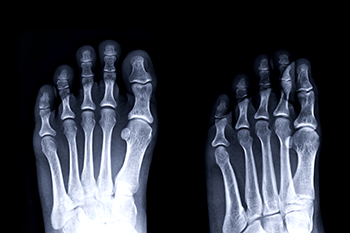
Your feet serve as the foundation for human mobility. They are nothing short of marvels of engineering, designed to support your entire body weight, absorb shock, and facilitate movement. Each foot has 26 bones, 33 joints, and more than 100 muscles, tendons, and ligaments, all working in harmony to enable a wide range of actions. The arches of the feet, defined as longitudinal and transverse, act as natural shock absorbers, adapting to various surfaces while maintaining stability. Feet play an essential role in balance, stability, and posture. The soles, packed with sensory receptors, provide constant feedback to the brain, aiding in balance and coordination. Furthermore, the feet can endure significant stress, clocking thousands of miles in a lifetime. In essence, feet are not merely anatomical structures, they are the unsung heroes of our daily lives, ensuring we stand, walk, run, and dance through life with grace and resilience. If you would like to learn additional facts about the function of the feet, it is suggested that you speak to a podiatrist who is an expert in this field.
If you have any concerns about your feet, contact one of our podiatrists from Central Ohio Comprehensive Foot Care. Our doctors can provide the care you need to keep you pain-free and on your feet.
Biomechanics in Podiatry
Podiatric biomechanics is a particular sector of specialty podiatry with licensed practitioners who are trained to diagnose and treat conditions affecting the foot, ankle and lower leg. Biomechanics deals with the forces that act against the body, causing an interference with the biological structures. It focuses on the movement of the ankle, the foot and the forces that interact with them.
A History of Biomechanics
- Biomechanics dates back to the BC era in Egypt where evidence of professional foot care has been recorded.
- In 1974, biomechanics gained a higher profile from the studies of Merton Root, who claimed that by changing or controlling the forces between the ankle and the foot, corrections or conditions could be implemented to gain strength and coordination in the area.
Modern technological improvements are based on past theories and therapeutic processes that provide a better understanding of podiatric concepts for biomechanics. Computers can provide accurate information about the forces and patterns of the feet and lower legs.
Understanding biomechanics of the feet can help improve and eliminate pain, stopping further stress to the foot.
If you have any questions please feel free to contact one of our offices located in Delaware and Westerville, OH . We offer the newest diagnostic and treatment technologies for all your foot and ankle needs.
Are Bunions Affecting Your Everyday Life?
Symptoms of Arthritis in the Feet
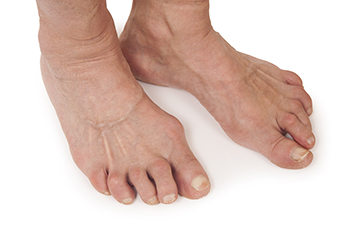
Arthritis is a common condition that affects millions of people worldwide, and it can manifest in various parts of the body, including the feet and ankles. If you have been experiencing persistent discomfort or pain in your lower extremities, it is essential to understand the signs and symptoms of arthritis in the feet and ankles, and to seek timely treatment. One of the earliest symptoms is pain, often accompanied by stiffness in the affected joints. Arthritis can make simple activities such as walking or climbing stairs painful. Inflammation is common in patients who have arthritis, leading to noticeable swelling and redness around the affected joints, especially after prolonged periods of activity. Arthritis can also cause decreased flexibility and range of motion in the feet and ankles, making it difficult to move them as freely as before. In some cases, chronic arthritis can result in joint deformities, such as bunions or hammer toes. As arthritis progresses, it can significantly affect your ability to walk comfortably and may lead to limping. If you are experiencing any of these symptoms, it is suggested that you make an appointment with a podiatrist for a proper diagnosis and tailored treatment plan.
Arthritis can be a difficult condition to live with. If you are seeking treatment, contact one of our podiatrists from Central Ohio Comprehensive Foot Care. Our doctors can provide the care you need to keep you pain-free and on your feet.
Arthritic Foot Care
Arthritis is a term that is commonly used to describe joint pain. The condition itself can occur to anyone of any age, race, or gender, and there are over 100 types of it. Nevertheless, arthritis is more commonly found in women compared to men, and it is also more prevalent in those who are overweight. The causes of arthritis vary depending on which type of arthritis you have. Osteoarthritis for example, is often caused by injury, while rheumatoid arthritis is caused by a misdirected immune system.
Symptoms
- Swelling
- Pain
- Stiffness
- Decreased Range of Motion
Arthritic symptoms range in severity, and they may come and go. Some symptoms stay the same for several years but could potentially get worse with time. Severe cases of arthritis can prevent its sufferers from performing daily activities and make walking difficult.
Risk Factors
- Occupation – Occupations requiring repetitive knee movements have been linked to osteoarthritis
- Obesity – Excess weight can contribute to osteoarthritis development
- Infection – Microbial agents can infect the joints and trigger arthritis
- Joint Injuries – Damage to joints may lead to osteoarthritis
- Age – Risk increases with age
- Gender –Most types are more common in women
- Genetics – Arthritis can be hereditary
If you suspect your arthritis is affecting your feet, it is crucial that you see a podiatrist immediately. Your doctor will be able to address your specific case and help you decide which treatment method is best for you.
If you have any questions, please feel free to contact one of our offices located in Delaware and Westerville, OH . We offer the newest diagnostic and treatment technologies for all your foot care needs.









